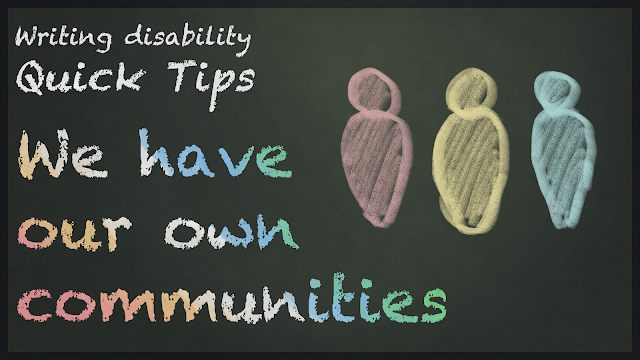We have communities - Writing disability quick tips
So often, stories centred on disabled characters, especially in modern settings, emphasise how lonely or isolated the character is because of their disability, especially if it’s a newly acquired disability or one that non-disabled people assume would have a big impact on our ability to do “fun stuff”. This will often be accompanied by statements of “no-one understands what living with [insert disability here]” is like!
And while isolation and loneliness are things a lot of disabled people deal with, a lot of us are not completely alone either, especially in the modern day.
Just like any group of people with shared experiences, we find one another. Sometimes this is through formal systems; some spinal rehabilitation centres for example, will pair newly paralysed people up with a mentor who’s had a similar form of paralysis for much longer to help guide the person while the adjust to their new disability. Other more formal systems can look like disability sporting organisations - the one I used to work for used to specifically encourage very newly disabled people to join so they didn’t feel like the had to learn everything about their disability alone, or support groups.
Other times though, these communities are much less formal. They may look like online forums, such as the ones on Reddit, built by and for disabled people to talk about their experiences and seek recommendations from others in the same boat, or parts of larger social media sites. For example, on Tumblr, there aren’t really any formal groups, but thanks to the hashtags we use in our posts, we often find one another fairly quickly there. We sometimes also carve out our own little subsections of fandom or hobby spaces, brought together by the shared interest itself, how things like disability might impact the way you interpret or interact with it, and how we can modify it (in the case of hobbies) to make it work for us.
A lot of disability communities, formal or otherwise, also form out of necessity, such as advocacy groups run by and for disabled people, and those built around ensuring the rights of disabled people are protected.
Isolation and loneliness are problems within the disabled community that many of us deal with, but this tends to be more in the context of isolation from the wider public, exclusion from public spaces and events (despite there being laws that are supposed to stop this because they’re often not enforced), disconnect from non-disabled friends and family, etc, most of which are the result of systematic issues or the lack of understanding or care and support from non-disabled people in our lives. Not always, but often.
The communities made by and for disabled people though are often (at least in part) made to help make up for this, and they’re more common than you might think, you just have to know where to look. It would be nice to see more creators reflecting this in their work a bit more often, or at least acknowledging that they are there, even if your character chooses not to engage with them.
However, as a reminder to authors and creatives:
These communities, especially the online ones, are for disabled people, they are not there for you to use as a reference as a creator. Some communities are ok with you being there to learn, so long as you listen and don’t try to speak over/bombard their members with questions. Others are not. The ones that are, typically will have something written somewhere if it’s online (e.g. subreddits that accept writers wanting to write disabled characters will often have it written in the “about” section or the rules). There are also dedicated groups and platforms for non-disabled people seeking to learn more about us and our communities, which can be excellent resources for creatives like writers. Just remember to be mindful of where you are and respectful of people’s spaces and boundaries when doing your research.

Comments